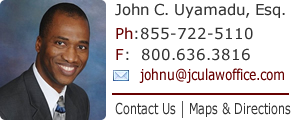Immigration
Family Based Immigration
A U.S. citizen whose immediate family member is not a U.S. citizen may apply for the non-citizen family member to be granted permission to come to the U.S. If the non-citizen family member is legally in the U.S., and have not over-stayed his or her visa when the petition is approved, he or she can file form I-485 to be granted permission to change status from a non-immigrant alien to a lawful permanent resident. The family member could be a parent, spouse, or child under the age of 21. These immediate family members are given priority consideration for visa number allocation. If the family member is outside the U.S. at the time the petition is approved and visa number allocated, that family member will attend visa interview in the nearest U.S. consulate that covers his or her legal residence which may be country of birth or country of legal residence.
Employment Based Immigration
A U.S. based employer or business can apply for employment authorization and visas to be granted to a potential employee who is not a lawful permanent resident of U.S. This type of petition is for a temporary authorization to be gainfully employed in the U.S. There are two types of petitions that could be filed. First, is I-129 for nonimmigrant work authorization; or secondly, the H-1B visa. The later requires that the potential employee have a bachelor’s degree or its equivalent, will be working in a specialty area and earn wage. Recently, there has been tightening of the conditions for granting the H-1B visa, for example, the bachelor’s degree major must exactly match the field of employ. USCIS generally denies petitions for three-year bachelor’s degree on the basis that it does not equate to a U.S. four-year bachelor’s degree, or denial because the major does not sufficiently match the field of employ. This problem can be avoided by using an approved credit conversion agency here in the U.S. to convert the bachelor’s degree credits to show that they are equivalent of the credits awarded for similar studies in a 4-year U.S. University. Also any work experience in the matches the field of employ, can be used to supplement the bachelor’s degree to show match for the intended field of employ.
If the petition is approved and the potential employee is a citizen of a country that does not have a visa waiver, then the potential employee will apply for visa in the nearest U.S. consulate to his or her place of legal residence. If the potential employee is a citizen of a country that has visa waiver, the approved petition will be presented to the port of entry from which the employee will enter the U.S.
Naturalization and Citizenship
A lawful permanent resident of the U.S. who has met the pre-conditions may apply to become a naturalized citizen of the U.S. Also a U.S. citizen may apply for her natural child born abroad to be granted U.S. citizenship, or for her legally adopted child in a foreign country to be granted U.S. citizenship. The process for filing the petitions for naturalization is a rigorous one and need to be done properly to avoid undue delay and denial.
Deportation and Removal
A non-immigrant visitor to the U.S., who has overstayed his or her authorized stay period, is likely to be put in removal status or proceeding. When this happens, the non-immigrant alien, whether in detention or free, will better protect his or her interest by speaking with an immigration lawyer. An attorney will assist in protecting the interest of the person involved. In some rare cases, the alien may be able to file a petition to be allowed to stay legally in the U.S. based on the sound discretion of the applicable Court. An immigration lawyer can help in navigating this complex proceedings.
For all your immigration related matters, contact us for an appointment. Initial consultation is free.





